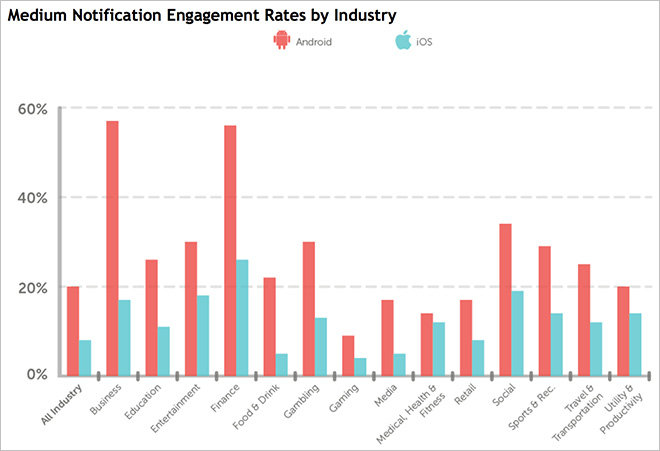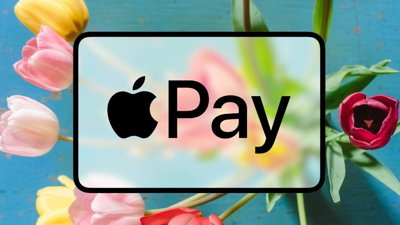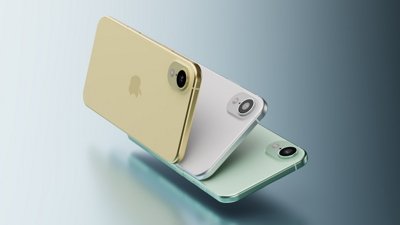Mobile development services firm Urban Airship on Thursday released a study that found Android users are on average more than two times more responsive to push notifications than iOS device users.
Drawing from a data set of almost 3,000 apps and 100 billion push notifications sent out to 500 million users in 2014, Urban Airship sampled notification response rates for apps in the 90th, 50th and 10th percentiles, ranked respectively as high, medium and low performers.
Medium-performing apps generated engagement rates of 20 percent for Android and only eight percent for iOS. Year-over-year data showed Apple device user engagement up one percent, however, while Android dropped eight percent over the same period.
Apps classified as high performers saw engagements grow 24 percent and 13 percent for iOS and Android, respectively, suggesting notifications from certain categories are becoming more effective.
Urban Airship said response rates are likely higher on Android due to the way Google's operating system handles incoming push notifications. On Android, notifications remain on the lock screen until dismissed, and are subsequently moved to the Notification Status bar once the device is unlocked.
Apple's solution is similar, but when a device is unlocked notifications are automatically routed to the Notification Center where they are grouped by app in chronological order. In addition, iOS device users can manage notification badges, banners and sound alerts on a per-app basis.
In an industry-level analysis, finance apps drew some of the highest response rates for both iOS and Android, an unsurprising result considering users in this category are likely receiving alerts from banks or credit card providers.
For Android, business apps sat at the top of Urban Airship's rankings with an engagement rate nearing 60 percent. Apps of the same ilk notched performances in the top-five for iOS, but fell far short of Android with rates below 20 percent. Social networking titles also saw decent notification response rates on both platforms, coming in an overall second for iOS and third for Android.
Finally, engagement rates of high-performing apps grew across the board, with top iOS apps jumping 24 percent and Android apps boosted 13 percent year-over-year.
"A core advantage of apps is the ability to reach out beyond their confines to engage people on device home screens and smartwatch faces— the only always-on screens that are never more than a glance away," said Urban Airship president and CEO Brett Caine.
 AppleInsider Staff
AppleInsider Staff







-m.jpg)






 Christine McKee
Christine McKee
 Marko Zivkovic
Marko Zivkovic
 Wesley Hilliard
Wesley Hilliard
 Malcolm Owen
Malcolm Owen


 William Gallagher
William Gallagher
-xl-xl-m.jpg)









42 Comments
But what does that mean? It sounds to me like "unsolicited ads in your mailbox", in which I simply don't engage. I have no idea what the "almost 3,000 apps and 100 billion push notifications sent out to 500 million users in 2014" said. Was it an offer for an upgrade? Did the messages tell you you should play a game more? Did the messages just say "Hello!", and Android users opened the apps, whereas iOS users tend to better ignore spam? :)
[quote name="fryke" url="/t/186460/study-device-users-more-responsive-to-android-app-notifications-than-ios#post_2728040"]But what does that mean? It sounds to me like "unsolicited ads in your mailbox", in which I simply don't engage. I have no idea what the "almost 3,000 apps and 100 billion push notifications sent out to 500 million users in 2014" said. Was it an offer for an upgrade? Did the messages tell you you should play a game more? Did the messages just say "Hello!", and Android users opened the apps, whereas iOS users tend to better ignore spam? :)[/quote] Ads don't get notifications as far as I know, so they aren't for spam. Ads don't even show up in the regular GMail mailbox, at least not mine anyway. I have to go looking for them in a separate folder, tho I've never had a reason to.
Oh, I meant a real life box. For your snailmail. Sorry. Might have been a tad unclear. My point is: I dunno what the push notifications were in their test.
This only serves to show that Android users need notifications just to find apps on their phone. I know people that ask me to send them an instant message just so that they can open that respective app. Without the notification, they have difficulty finding it in their Android mess.
could be that when you install an iOS app, you have to manually activate notifications when asked. I'm pretty sure on android it's on by default and you have to root through settings then switch them off app by app.